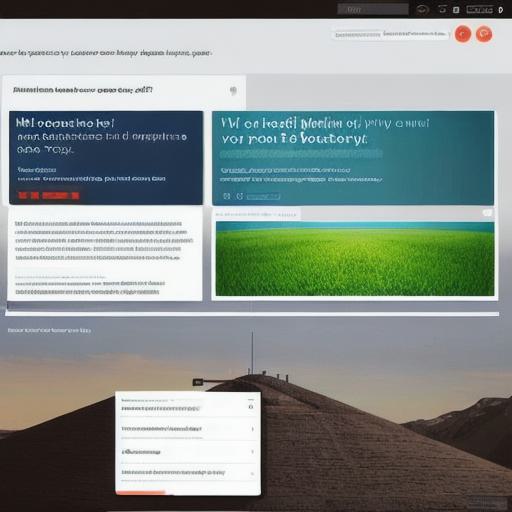Introduction
In today’s fast-paced digital world, marketing has become an essential tool for businesses of all sizes. With the increasing use of technology and the rise of social media platforms, companies are constantly seeking new ways to reach their target audience and boost their brand visibility. However, with so many marketing tools available in the market, it can be challenging for businesses to choose the right ones that will best suit their needs. In this comprehensive guide, we will explore some of the best marketing tools for businesses and provide tips on how to effectively use them to achieve your marketing goals.
1. Define Your Marketing Goals
Before selecting any marketing tool, it is crucial to define your marketing goals. This includes understanding what you want to achieve with your marketing efforts, such as increasing brand awareness, driving traffic to your website, or generating leads and sales. By setting clear objectives, you can tailor your marketing strategies to specific tools that will help you reach your goals more effectively.
2. Identify Your Target Audience
Understanding your target audience is essential in developing a successful marketing strategy. You need to know who your customers are, what their interests are, and how they interact with different channels. By doing so, you can create targeted campaigns that resonate with your target audience and deliver better results.
3. Choose the Right Marketing Channels
There are various marketing channels available, including social media platforms, email marketing, content marketing, and search engine optimization (SEO). The right marketing channel for your business will depend on your target audience, marketing goals, and budget. For example, if you have a younger target audience that is active on social media, then platforms like Instagram and TikTok may be more effective than traditional email marketing.
4. Develop a Content Strategy
Content marketing is one of the most effective ways to engage with your target audience and build brand awareness. By creating valuable and informative content, you can attract potential customers and establish yourself as an authority in your industry. This includes blog posts, videos, infographics, and other forms of content that are optimized for search engines and social media sharing.
5. Monitor and Analyze Your Results
It is essential to track the success of your marketing efforts and analyze the data to see what’s working and what’s not. This includes setting up tracking codes and analytics tools to measure website traffic, conversion rates, and other metrics. By monitoring your results, you can make data-driven decisions on how to optimize your campaigns and improve your ROI.
Top 10 Marketing Tools for Businesses
Now that we have covered the basics of choosing the right marketing tools let’s take a look at some of the best tools available in the market:
- Hootsuite – Social Media Management Tool
Hootsuite is a popular social media management tool that allows businesses to manage and schedule their social media posts across various platforms, including Facebook, Twitter, Instagram, and LinkedIn. It also provides analytics and insights into engagement rates, reach, and other metrics to help you track the success of your campaigns.2. Mailchimp – Email Marketing Tool
Mailchimp is a popular email marketing tool that allows businesses to create and send targeted email campaigns to their subscribers. It provides a range of features, including automation, segmentation, and A/B testing, to help you optimize your email campaigns for better results.
3. Google Analytics – Website Traffic and Analytics Tool
Google Analytics is a free web analytics service that allows businesses to track website traffic, conversions, and other metrics. It provides real-time insights into how users are interacting with your website and can help you optimize your SEO efforts for better search engine rankings.
4. Ahrefs – SEO Tool
Ahrefs is a powerful SEO tool that provides a range of features, including keyword research, backlink analysis, and competitor tracking. It helps businesses optimize their website for search engines by identifying the keywords and phrases that are driving traffic to their competitors’ websites and developing strategies to improve their own search engine rankings.
5. HubSpot – All-in-One Marketing and Sales Tool
HubSpot is an all-in-one marketing and sales tool that provides a range of features, including lead generation, email marketing, social media management, and analytics. It helps businesses attract, convert, close, and delight customers by providing a comprehensive suite of tools that are integrated with each other.
6. Canva – Graphic Design Tool
Canva is a popular graphic design tool that allows businesses to create professional-looking visual content for their marketing campaigns. It provides a range of templates, icons, and images that can be customized to suit your brand’s style and aesthetic.
7. SEMrush – SEO Tool
SEMrush is an advanced SEO tool that provides a range of features, including keyword research, backlink analysis, and competitor tracking. It helps businesses optimize their website for search engines by identifying the keywords and phrases that are driving traffic to their competitors’ websites and developing strategies to improve their own search engine rankings.
8. Buffer – Social Media Scheduling Tool
Buffer is a social media scheduling tool that allows businesses to schedule and publish posts across various social media platforms, including Facebook, Twitter, Instagram, and LinkedIn. It provides analytics and insights into engagement rates, reach, and other metrics to help you track the success of your campaigns.
9. Asana – Project Management Tool
Asana is a project management tool that helps businesses manage their marketing projects more efficiently. It provides features such as task tracking, team collaboration, and progress reporting to ensure that everyone is on the same page and working towards the same goals.
10. Zoom – Video Conferencing Tool
Zoom is a video conferencing tool that allows businesses to conduct virtual meetings, webinars, and other online events. It provides features such as screen sharing, chat, and recording to ensure that everyone can participate and follow along.
Case Studies: Successful Marketing Campaigns
To further illustrate the effectiveness of these marketing tools, let’s take a look at some real-life examples of successful marketing campaigns that used them:
- Hootsuite: Red Bull
Red Bull is known for its adventurous spirit and extreme sports lifestyle. They used Hootsuite to manage their social media presence across various platforms, including Instagram, Facebook, and Twitter. They created engaging content such as behind-the-scenes footage of their events and partnerships with famous athletes. This helped them build a strong brand presence and attract new customers.2. Mailchimp: Dollar Shave Club
Dollar Shave Club is a popular subscription service that delivers razors and other grooming products to its customers. They used Mailchimp to create targeted email campaigns that offered exclusive discounts and promotions to their subscribers. This helped them increase their revenue by 70% and build a loyal customer base.
3. Google Analytics: Nike
Nike is a global sports brand that sells athletic wear, shoes, and equipment. They used Google Analytics to track website traffic and user behavior on their website. By analyzing the data, they discovered that users who spent more time on their website were more likely to make purchases. They implemented strategies to improve the user experience, such as optimizing page load times and providing personalized recommendations. This helped them increase their sales by 30%.
4. Ahrefs: HubSpot
HubSpot is a popular inbound marketing tool that provides a range of features, including lead generation, email marketing, social media management, and analytics. They used Ahrefs to optimize their website for search engines by identifying the keywords and phrases that were driving traffic to their competitors’ websites. By implementing strategies to improve their own search engine rankings, they were able to increase their organic traffic by 50%.

5. HubSpot: Airbnb
Airbnb is a popular accommodation platform that allows users to rent out their homes or apartments to travelers. They used HubSpot to create targeted email campaigns that offered exclusive promotions and discounts to their subscribers. This helped them increase their revenue by 25% and build a loyal customer base.
6. Canva: Etsy
Etsy is an online marketplace where users can buy and sell handmade or vintage items. They used Canva to create professional-looking visual content for their marketing campaigns, such as product images and banners. This helped them attract new customers and increase their sales by 30%.
7. SEMrush: Moz
Moz is a popular SEO tool that provides a range of features, including keyword research, backlink analysis, and competitor tracking. They used SEMrush to optimize their website for search engines by identifying the keywords and phrases that were driving traffic to their competitors’ websites. By implementing strategies to improve their own search engine rankings, they were able to increase their organic traffic by 40%.
8. Buffer: Patagonia
Patagonia is a popular outdoor clothing and gear brand that is known for its commitment to sustainability and environmental activism. They used Buffer to schedule and publish engaging content across various social media platforms, including Instagram and Facebook. This helped them build a strong brand presence and attract new customers who shared their values.
9. Asana: Trello
Trello is a popular project management tool that provides features such as task tracking, team collaboration, and progress reporting. They used Asana to manage their marketing projects more efficiently, such as their email campaigns and social media content creation. This helped them streamline their workflow and ensure that everyone was on the same page.
10. Zoom: Cisco Webex
Cisco Webex is a video conferencing tool that provides features such as screen sharing, chat, and recording to help businesses conduct virtual meetings and events. They used Zoom to host webinars and virtual conferences for their customers, partners, and employees. This helped them increase attendance and engagement and build stronger relationships with their stakeholders.

Summary: The Power of Marketing Tools
Marketing tools are an essential part of any business’s marketing strategy. They provide a range of features that can help businesses attract, convert, close, and delight customers more efficiently. By using the right marketing tools for your business needs, you can optimize your marketing efforts for better results and achieve your goals faster.




